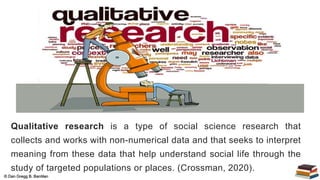Qualitative research and its importance in daily life
- 1. © Dan Gregg B. Bantilan
- 2. CONTENTS Qualitative Research © Dan Gregg B. Bantilan
- 3. © Dan Gregg B. Bantilan
- 4. Qualitative research is a type of social science research that collects and works with non-numerical data and that seeks to interpret meaning from these data that help understand social life through the study of targeted populations or places. (Crossman, 2020). © Dan Gregg B. Bantilan
- 5. Qualitative research is multimethod in focus, involving an interpretive, naturalistic approach to its subject matter. This means that qualitative researchers study things in their natural settings, attempting to make sense of, or interpret, phenomena in terms of the meanings people bring to them. Denzin and Lincoln (1994, p. 2) © Dan Gregg B. Bantilan
- 6. Characteristics of a Qualitative Research © Dan Gregg B. Bantilan
- 7. © Dan Gregg B. Bantilan
- 8. © Dan Gregg B. Bantilan
- 9. Types of Qualitative Research © Dan Gregg B. Bantilan
- 10. • ETHNOGRAPHY • GROUNDED THEORY • NARRATIVE INQUIRY • PHENOMENOLOGY • CASE STUDY © Dan Gregg B. Bantilan
- 11. ETHNOGRAPHY © Dan Gregg B. Bantilan
- 12. © Dan Gregg B. Bantilan
- 13. RESEARCH TITLES: © Dan Gregg B. Bantilan
- 14. GROUNDED THEORY © Dan Gregg B. Bantilan
- 15. © Dan Gregg B. Bantilan
- 16. RESEARCH TITLES: © Dan Gregg B. Bantilan
- 17. NARRATIVE INQUIRY © Dan Gregg B. Bantilan
- 18. © Dan Gregg B. Bantilan
- 19. RESEARCH TITLES: © Dan Gregg B. Bantilan
- 20. PHENOMENOLOGY © Dan Gregg B. Bantilan
- 21. © Dan Gregg B. Bantilan
- 22. RESEARCH TITLES: © Dan Gregg B. Bantilan
- 23. CASE STUDY . © Dan Gregg B. Bantilan
- 24. RESEARCH TITLES: © Dan Gregg B. Bantilan
- 25. Identify Qualitative Research Design © Dan Gregg B. Bantilan
- 26. A research on “Lives of Tricycle Drivers in Malabon” ETHNOGRAPY GROUNDED THEORY NARRATIVE INQUIRY CASE STUDY PHENOMENOLOGY © Dan Gregg B. Bantilan
- 27. ETHNOGRAPY GROUNDED THEORY NARRATIVE INQUIRY CASE STUDY PHENOMENOLOGY A research on “Iskwater Noon, Iskwater Ngayon” © Dan Gregg B. Bantilan
- 28. ETHNOGRAPY GROUNDED THEORY NARRATIVE INQUIRY CASE STUDY PHENOMENOLOGY A research on “TRAIN or Tax Reform for Acceleration and Inclusion” © Dan Gregg B. Bantilan
- 29. ETHNOGRAPY GROUNDED THEORY NARRATIVE INQUIRY CASE STUDY PHENOMENOLOGY A research on “Parlorista Echepwera: The Discrimination within the LGBT community” © Dan Gregg B. Bantilan
- 30. ETHNOGRAPY GROUNDED THEORY NARRATIVE INQUIRY CASE STUDY PHENOMENOLOGY A research on “Hypersexuality among Adolescents”
- 31. Advantages or Strenght of Qualitative Research © Dan Gregg B. Bantilan
- 32. 1. It adopts a naturalistic approach to its subject matter, which means that those involve in the research understand things based on what they find meaningful. 2. It promotes a full understanding of human behavior or personality traits in their natural setting. 3. It is instrumental for positive societal changes. 4. It engnders respect for people's individuality as it demands the researcher's careful and attentive stand toward people's world views. 5. It is a way of understanding and interpreting social interactions. 6. It increases the researcher's interest in the study as t includes the researcher's experience or background knowledge in interpreting verbal and visual data. 7. It offers multiple ways of acquiring and examining knowledge about something. © Dan Gregg B. Bantilan
- 33. Disadvantages or Weakness of Qualitative Research © Dan Gregg B. Bantilan
- 34. 1.It involves a lot of researcer's subjectivity in data analysis 2.It is hard to know the validity or reliability of the data. 3.Its open-ended questions yield “data overload” that requires long-time analysis. 4.It is time-consuming 5.It involves several processes, which results greatly depend on the researcher's views or interpretations. © Dan Gregg B. Bantilan
- 35. © Dan Gregg B. Bantilan


































